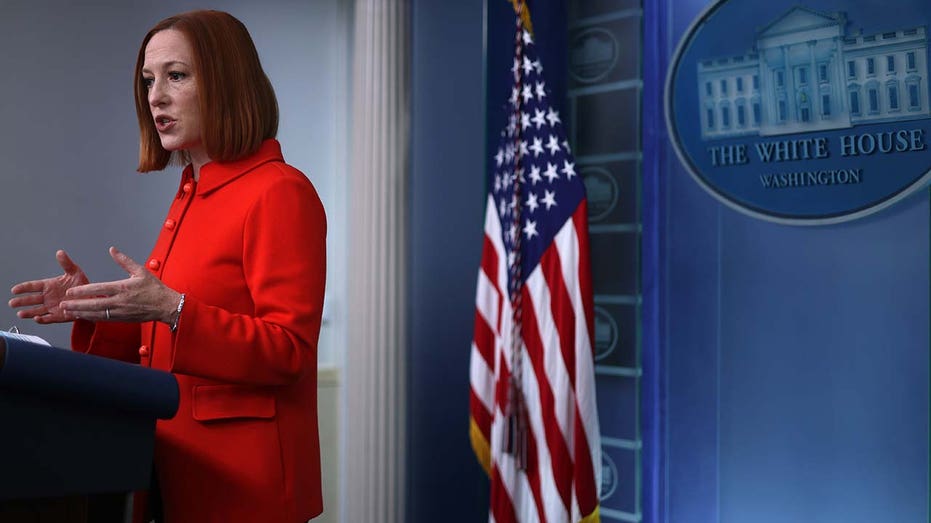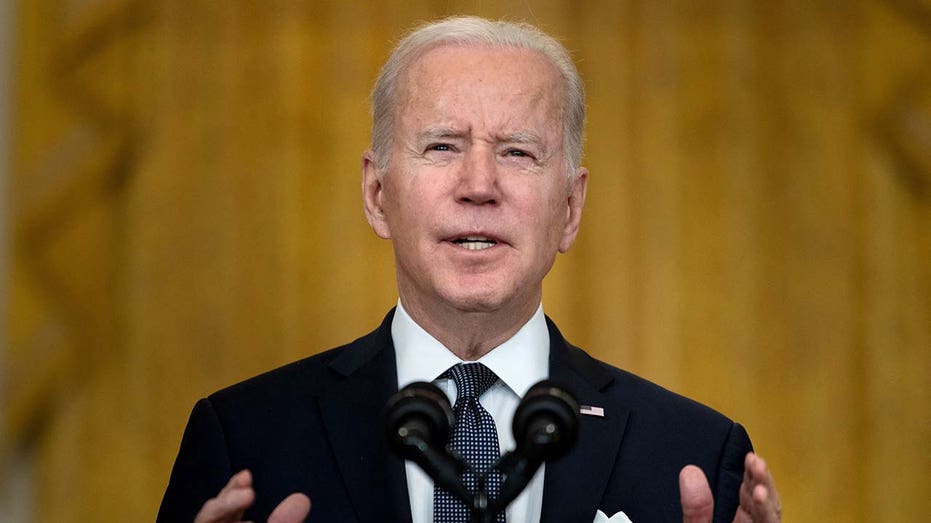As oil price climbs, Biden White House reiterates call for help from foreign producers
U.S. energy producers say they could help if the Biden administration would let them
Oil expert warns California will hit highest ever gasoline cost within the next 48 hours
OPIS chief oil analyst Tom Kloza discusses the impact of the Russia-Ukraine conflict on the oil and gas industry.
The Biden administration on Wednesday continued to emphasize its strategy of urging other oil-producing nations to increase output as part of its plan to combat the surging energy prices that continue to climb in the U.S., helping fuel historic inflation.
During a press briefing, White House press secretary Jen Psaki was asked about what the administration was doing as the price of oil approaches $100 a barrel, which is a milestone that has not been seen since 2014.

White House Press Secretary Jen Psaki conducts a daily press briefing at the James S. Brady Press Briefing Room of the White House February 16, 2022, in Washington, DC. (Photo by Alex Wong/Getty Images / Getty Images)
"We have been in touch with allies and partners, with suppliers out there on the global stage for weeks now in preparation for a range of impacts of, you know, in anticipation of an invasion or actually an impact of an invasion both for natural gas and oil prices on the market," Psaki said, referring to the possibility of Russia invading Ukraine and causing further strain.
"We will continue those engagements, of course, as I've said, and I said yesterday for the president, all options remain on the table," Psaki continued, reminding reporters that President Biden tapped the U.S.'s strategic petroleum reserve in recent months in an effort combat the rising prices.
RUSSIA CONFLICT STOKES ENERGY CONCERNS AS GAS PRICES CONTINUE TO CLIMB
The press secretary added, "We also remain, of course, engaged with Congress and countries around the world about how to meet the demands out there."
But rising oil and gas prices have plagued the Biden administration since the president took office a year ago, and concerns about conflict between Russia and Ukraine have added fuel to the fire. President Biden and Psaki both warned Americans on Tuesday that an invasion by Russia would cause U.S. consumers even more pain at the pump.

President Joe Biden speaks in the East Room of the White House about Russian military activity near Ukraine in Washington, DC on February 15, 2022. (Photo by BRENDAN SMIALOWSKI/AFP via Getty Images / Getty Images)
Meanwhile, domestic energy producers have continued to urge the administration to allow them to step in and meet demand, as the White House continues to ramp up regulations and stifle production in the U.S. But so far, that has been to no avail.
US NATURAL GAS PRODUCER SAYS PRICES ARE SURGING DUE TO LACK OF ADEQUATE PIPELINE STRUCTURE
"They need new talking points," Jason Modglin, president of the Texas Alliance of Energy Producers told FOX Business in reaction to Psaki's comments. "The vice president’s trip to Europe presents an opportunity for the Biden administration to lead on expanding American [liquid natural gas] exports to solve global challenges. That takes renewed commitment to working with the states and producers to maximize production here, not cede the market to Russia and OPEC."
"The solution is not difficult," Modglin said. "It just requires the administration to recognize that clean-burning American natural gas and supporting the domestic hydrocarbon industry boost our security and the environment."

Russian President Vladimir Putin (L) and Saudi Arabia's King Salman (R) attend the official welcome ceremony in Riyadh, Saudi Arabia, on October 14, 2019. (Photo by ALEXANDER ZEMLIANICHENKO/POOL/AFP via Getty Images / Getty Images)
GET FOX BUSINESS ON THE GO BY CLICKING HERE
Meanwhile, the world's largest crude exporter, Saudi Arabia, has rejected the White House's requests to pump more oil despite calls from President Biden himself, according to the Wall Street Journal. Instead, the U.S. ally reiterated its commitment to the Organization of the Petroleum Exporting Countries and Russia, an alliance and cartel known as OPEC+.
On Wednesday, international oil benchmark Brent Crude hit $94.26 a barrel, up more than 20% this year as it edges toward the $100 per barrel milestone.





















